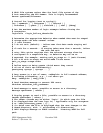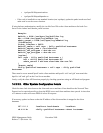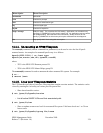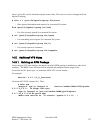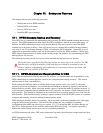14.4. Mounting VFS Filesystems
An HPSS fileset or directory is made available for user access by mounting it using the mount(8)
command. The mount command accepts the mount input options directly from the command line or from
the corresponding entry defined in the /etc/fstab file. By defining the mount options in the /etc/fstab file,
the mount command can be issued in a much simpler fashion.
14.4.1. Mounting via the Command Line
The input arguments to the mount command include a list of utility options, a file system type, options to
be passed to the Kernel Module, source device to be mounted, and the path of the mount point. The
format of the mount command to mount an HPSS fileset or directory is as follows:
# /sbin/mount –t hpssfs <source> <target> -o <options>
where:
<source> can be either an HPSS fileset identifier or the pathname of the HPSS directory
specified in the following format:
[LOCAL|"<site name>"]:[<path>|<fileset id>]
<target> is the local directory to mount the HPSS fileset or directory on
<options> are the mount options used to control the behavior of the mounted file system
An example of a command to mount a HPSS root directory tree is as follows:
# mount -t hpssfs LOCAL:/ /tmnt -o'cos=5'
In the above example, the “-t hpssfs” option refers to the VFS Interface filesystem type. When a mount
command for a VFS Interface filesystem is issued, one or more HPSS VFS Daemons are started to
manage the specified file system. In the above example, the root directory of the local HPSS system,
indicated by the ‘LOCAL:/’ parameter, is being mounted on the /tmnt mount point in order for users to
access the HPSS files. The mount option, specified by the –o option, specifies the HPSS COS to use for
file creates in the mounted HPSS fileset or directory. The complete list of supported mount options are
described in the section below, Mount Options.
14.4.2. Mounting via the ‘/etc/fstab’ File
The mount point for an HPSS fileset or directory can also be defined in the /etc/fstab file. Each line in
this file specifies a mount point. An example of a /etc/fstab file with three HPSS mount entries is as
follows:
# This file is edited by fstab-sync - see 'man fstab-sync' for details
/dev/VolGroup00/LogVol00 / ext3 defaults 1
1
LABEL=/boot /boot ext3 defaults 1 2
none /dev/pts devpts gid=5,mode=620 0
0
HPSS Management Guide November 2009
Release 7.3 (Revision 1.0) 351



